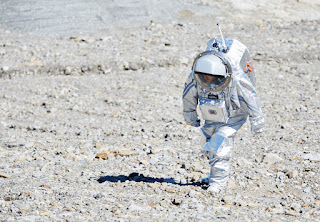Have you ever
imagined how it would feel being weightless? Most people need to rely on their
imagination to have a similar adventure or – go to space. But that’s not the
only possibility to turn the world upside down! Currently the German Aerospace
Center and the European Astronaut Center conduct a study, in which 12
participants stay in bed for 60 days. That might have an impact on your sense
of gravity…
a participants protocol
„Das erste Mal hatte ich das Gefühl schweben zu können, als ich vom Training kam. So ab dem 10 Tag in Bettruhe. Zuerst hatte ich es nur bei hellen Decken, dann überall – das Gefühl, dass ich schwerelos bin. Am liebsten fliege ich über Rohre, die sind ja so uneben. Und wenn ich in die große Halle fahre, wo die Decke ja mehrere Meter höher ist, habe ich das Gefühl, dass ich falle. Ich sage dann dem, der mich schiebt „Vorsicht, Stufe!“ Aber dann fällt mir ein, dass mir nichts passieren kann, weil ich ja schwebe und jemand der schwebt kann nicht fallen.
Zuerst wusste ich nicht, ob ich mir alles nur einbilde. Werde ich jetzt verrückt? Dann habe ich mit unserem Arzt gesprochen, der mir gesagt hat, dass das alles völlig normal wäre. Der Gleichgewichtssinn schaltet sich nach einer Weile einfach von selbst ab – und man nutzt nur noch seine Augen zur Wahrnehmung Dann ist eben oben gleich unten.
Ich habe keine Angst vor dem Schweben – ganz im Gegenteil, ich freue mich jedes Mal darauf. Es ist wie ein Abenteuer. Ich weiß ja, warum ich mich so fühle und kann es deshalb vielleicht genießen. Ich habe gehört, dass es nach dem Aufstehen nach 60 Tagen auch vorkommen kann, dass man nicht weiß, ob man sich selbst bewegt oder jemand anderes. Es ist eine ganz neue und spannende Erfahrung für mich und ich freue mich, dass ich sie haben kann.
Ich kann nur schweben, wenn ich mit dem Bett gefahren werde. Dann spüre ich selbst meinen Rücken, der auf der Matratze liegt, nicht mehr. Ich denke auch nicht mehr an meine Füße, da ich sie ja nicht brauche, wenn ich fliege. Es fühlt sich alles schwebend an. Ich habe früher immer den Traum gehabt, einmal ins Weltall zu fliegen um Schwerelosigkeit zu erleben. Jetzt ist es gar nicht mehr so stark, denn ich „weiß“ ja wie es sich anfühlt.
Aber, wenn ich mir vorstelle, nur noch in der Schwerelosigkeit leben zu müssen, dann würde ich den Boden unter den Füßen schon vermissen. Schwerkraft ist ja schon ziemlich praktisch.
In unserer Einrichtung gibt es auch ein Deckenfenster. Aber wenn ich dort entlangschwebe freue ich mich jedes Mal so sehr den Himmel zu sehen, dass ich selbst das Schweben vergesse.“
 “The first time
I felt weightless, just happened after my training. It was my 10th day in bed.
First, I only had the sensation, when I passed over bright ceilings, but then I
would experience it, every time someone would shift me from one place to
another. My favorite sensation is, when I pass pipelines, which are settled in
a lumpy way under the ceiling. Once I travel towards the big hall, which is
much higher than the corridor, I have the impression of falling. I tell the
person guiding me: “Pay attention to the steps!” But then I realize that
nothing can happen to me, because I am weightless.
“The first time
I felt weightless, just happened after my training. It was my 10th day in bed.
First, I only had the sensation, when I passed over bright ceilings, but then I
would experience it, every time someone would shift me from one place to
another. My favorite sensation is, when I pass pipelines, which are settled in
a lumpy way under the ceiling. Once I travel towards the big hall, which is
much higher than the corridor, I have the impression of falling. I tell the
person guiding me: “Pay attention to the steps!” But then I realize that
nothing can happen to me, because I am weightless. The first time I had the sensation of being weightless, I wasn’t sure if I will turn mad now. Our doctor assured me, that this is pretty normal, because my vestibular organ loses it orientation. Then, I only use my eyes for orientation. This could turn my world upside-down.
I am not afraid of being weightless – no: I really like it! It is an adventure. I know why I feel like that, which offers me a safe feeling to enjoy the journey in zero gravity. I’ve heard that the same effect can reappear after my bedrest phase. Some former participants could not distinguish between their own movements or the movements of other people. For me, the whole thing of being weightless is a new experience and I am thankful to have it.
I can only ‘fly’ when someone is moving me in my bed. Then I even don’t feel my back, which is settled on the mattress, anymore. I even don’t think about my feet anymore, because I don’t need them while flying. Everything is weightless. Years ago, I’ve always been dreaming of going to space one day to feel zero gravity. Today, I don’t think I have to there anymore – I’ve been there!
But, if I think about spending every day in zero gravity, I would decide to live on earth under normal conditions. I would miss touching the floor with my feet – and gravity has some practical benefits.
In our research department we also have a window at the ceiling. Every time I fly by, I am so happy to see the sky, that I even forget being weightless.”
more about the RSL bedrest study:
https://davidrsl.wordpress.com/
https://paulrsl.wordpress.com/
and: http://www.esa.int/Our_Activities/Human_Spaceflight/Bedrest_studies/60_days_and_60_nights_in_bed
more impressions: live at http://www.spaceup.nl/



